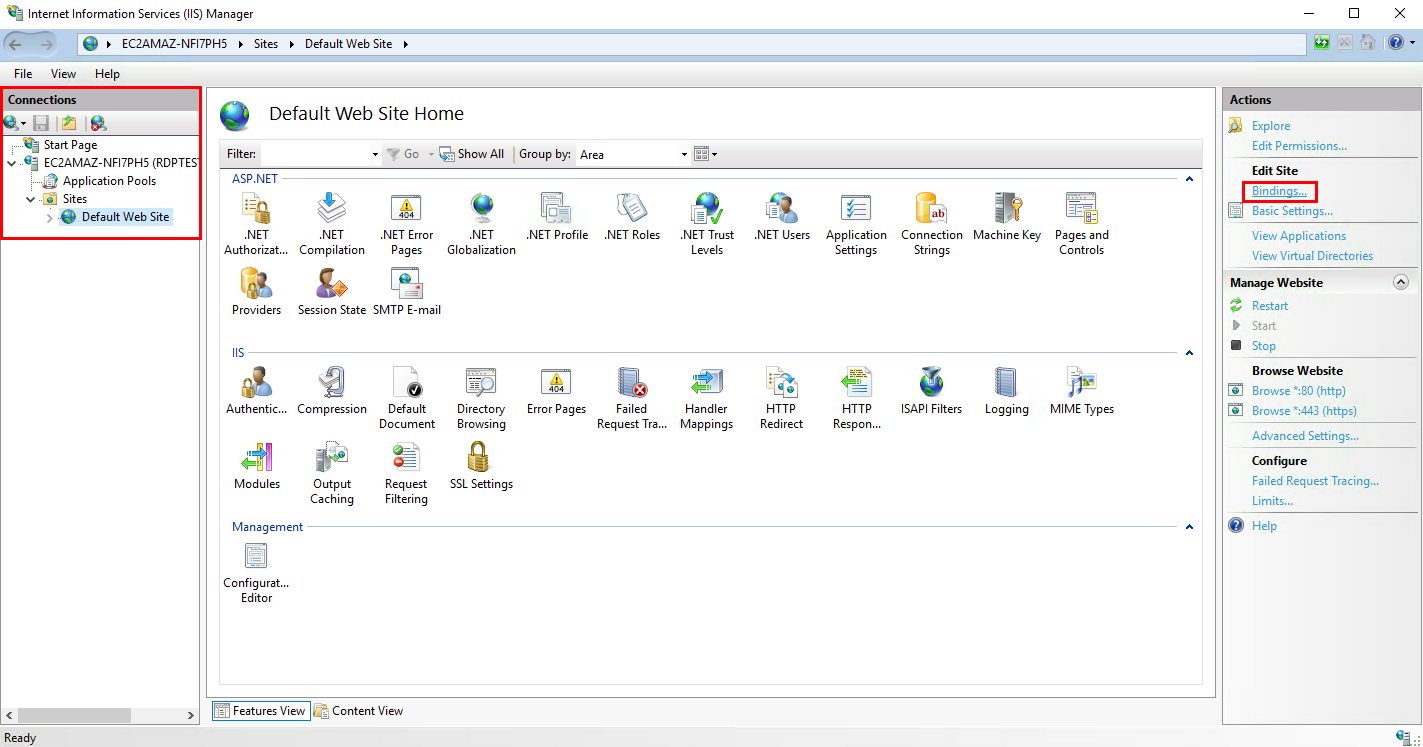Use the DigiCert® Certificate Utility for Windows to create a CSR and install your new SSL certificate on your Windows Server 2016
When it's time to renew your SSL certificate, you can use the DigiCert® Certificate Utility for Windows, to simply the process.
These instructions explain how to use the DigiCert® Certificate Utility for Windows, your DigiCert account, and IIS 10 to create your CSR, renew your SSL certificate, to install your certificate, and to use IIS 10 to configure your Windows Server 2016 to use the new certificate.
Process for Renewing Your SSL Certificate:
-
Create your CSR with the DigiCert Certificate Utility.
-
Renew your SSL certificate from your DigiCert account.
-
Install your new SSL certificate on your Windows Server 2016 with the DigiCert Certificate Utility.
How to Import Your SSL Certificate to Your Server with the DigiCert Utility.
-
Use IIS 10 to configure your server to use the new SSL certificate.
I. How to Create Your CSR with the DigiCert Utility
Best practices are to generate a new certificate signing request (CSR) when renewing your SSL certificate.
-
On the Windows Server 2016 with the expiring certificate, download and save the DigiCert® Certificate Utility for Windows executable (DigiCertUtil.exe).
-
Run the DigiCert® Certificate Utility for Windows.
Double-click DigiCertUtil.
-
In the DigiCert Certificate Utility for Windows©, click SSL (gold lock), select the expiring certificate, and then click Create CSR.
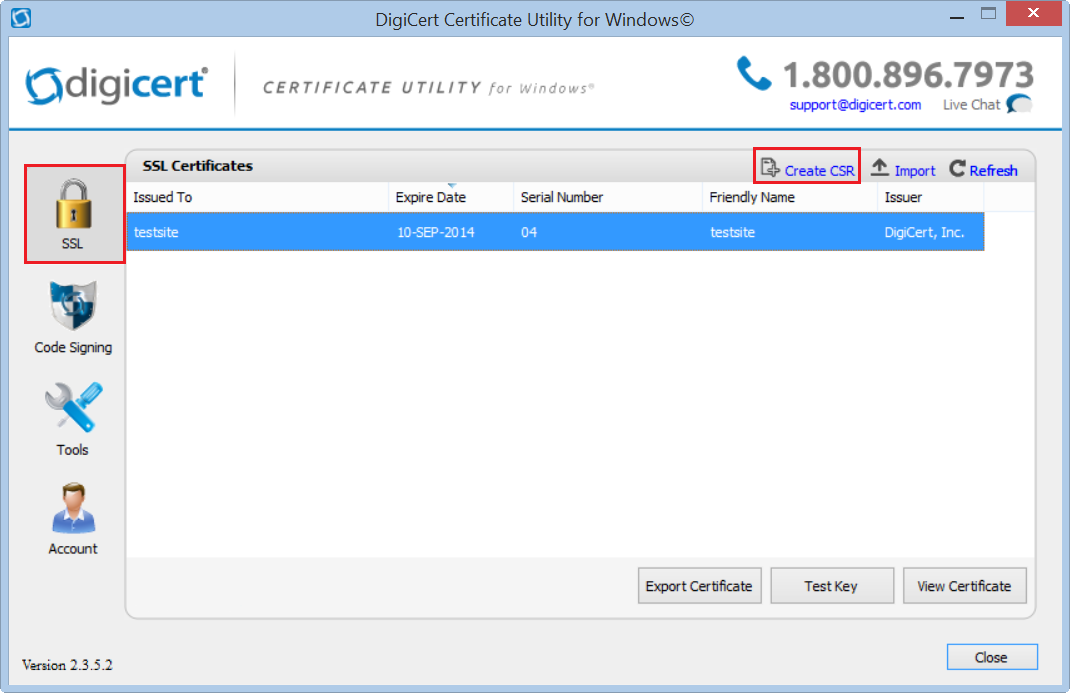
-
In the "Would you like to import the attributes from 'certificate' into the new CSR?" window, click Yes.
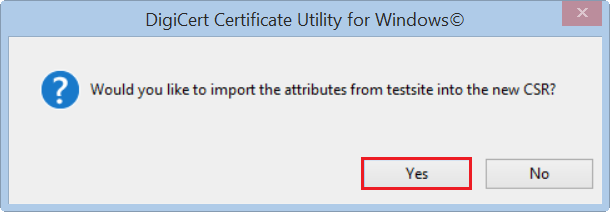
-
On the Create CSR page, verify that all the certificate details are correct and then click Generate.
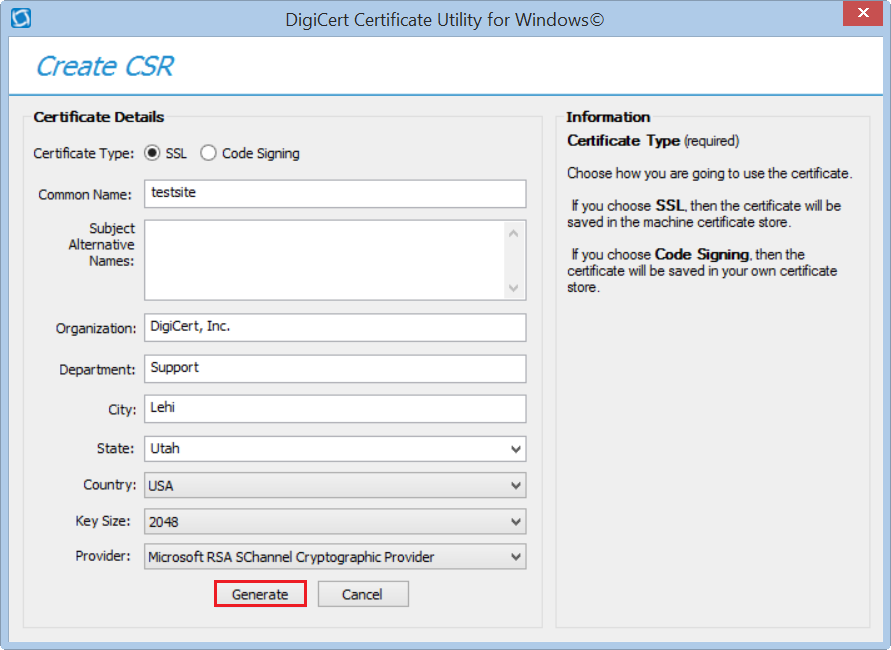
-
On DigiCert Certificate Utility for Windows© - Renew Certificate page, do one of the following, and then, click Close:
Click Copy CSR. Copies the certificate contents to the clipboard. If you use this option, we recommend that you paste the CSR into a tool such as Notepad. If you forget and copy some other item, you still have access to the CSR, and you do not have to go back and recreate it. Click Save to File. Saves the CSR as a .txt file to the Windows Server 2016. We recommend that you use this option. 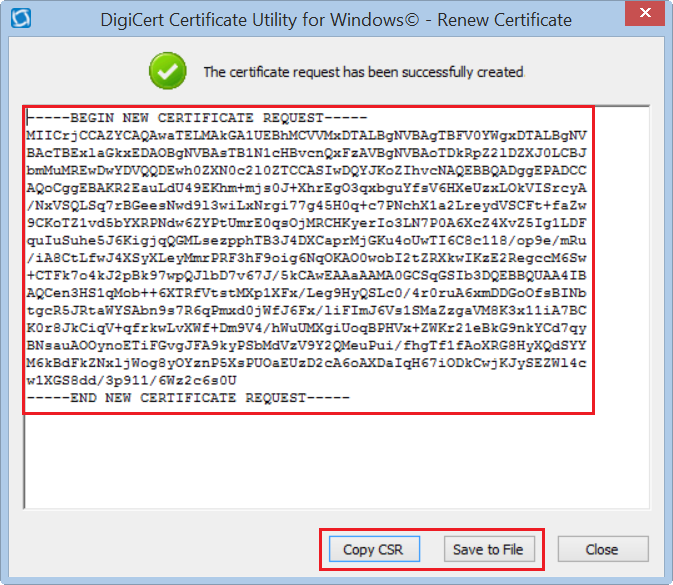
II. How to Renew Your SSL Certificate
Renew your SSL certificate from inside your DigiCert CertCentral account.
Are you new to the DigiCert team? You can "replace" your certificate with a DigiCert certificate. Order your new certificate here - Purchase Your DigiCert Certificate.
-
Log into your CertCentral account.
-
In CertCentral, in the left main menu, click Certificates > Expiring Certificates.
-
On the Expiring Certificates page, next to the certificate you want to renew, click Renew Now.
A certificate doesn't appear on the Expiring Certificates page until 90 days before it expires.
-
Follow the instructions provided inside your account to renew your SSL certificate.
-
Add your CSR
When renewing the certificate, you'll need to include a CSR. On the "Renewal" page, under Certificate Settings, upload the CSR file you saved to the server.
You can also use a text editor (such as Notepad) to open the file. Then, copy the text, including the -----BEGIN NEW CERTIFICATE REQUEST----- and -----END NEW CERTIFICATE REQUEST----- tags, and paste it in the Add Your CSR box.
-
After you place the order to renew your certificate, DigiCert verifies your information.
-
If we need any additional information, we will promptly contact you by phone or email. If no additional information is required, we will most likely issue your certificate within an hour.
III. How to Import Your SSL Certificate to Your Server with the DigiCert Utility
Once your renewal SSL Certificate has been issued, run the DigiCert Certificate Utility to import it to your Windows server 2016.
Microsoft Certificate Store Note:
When you use the DigiCert® Certificate Utility for Windows to import/install your SSL certificates on your Windows Server 2016, it will place the certificates in the Personal store instead of the Web Hosting store. If you have less then 20 to 30 certificates, this will not be a problem.
However, if you are managing 30 or more certificates you will need to move your certificates to the Web Hosting store, which was designed to scale to a greater number of certificates. See Move a Certificate from the Personal Store to the Web Hosting Certificate Store.
Importing Your New SSL Certificate to Your Windows Server 2016
-
On the Windows Server 2016, where you created the CSR, open the ZIP file containing your SSL certificate and save the contents of the file (e.g., your_domain_com.cer) to the folder where you saved the DigiCert Certificate Utility executable (DigiCertUtil.exe).
-
Run the DigiCert Certificate Utility.
Double-click DigiCertUtil.
-
In DigiCert Certificate Utility for Windows©, click SSL (gold lock) and then click Import.
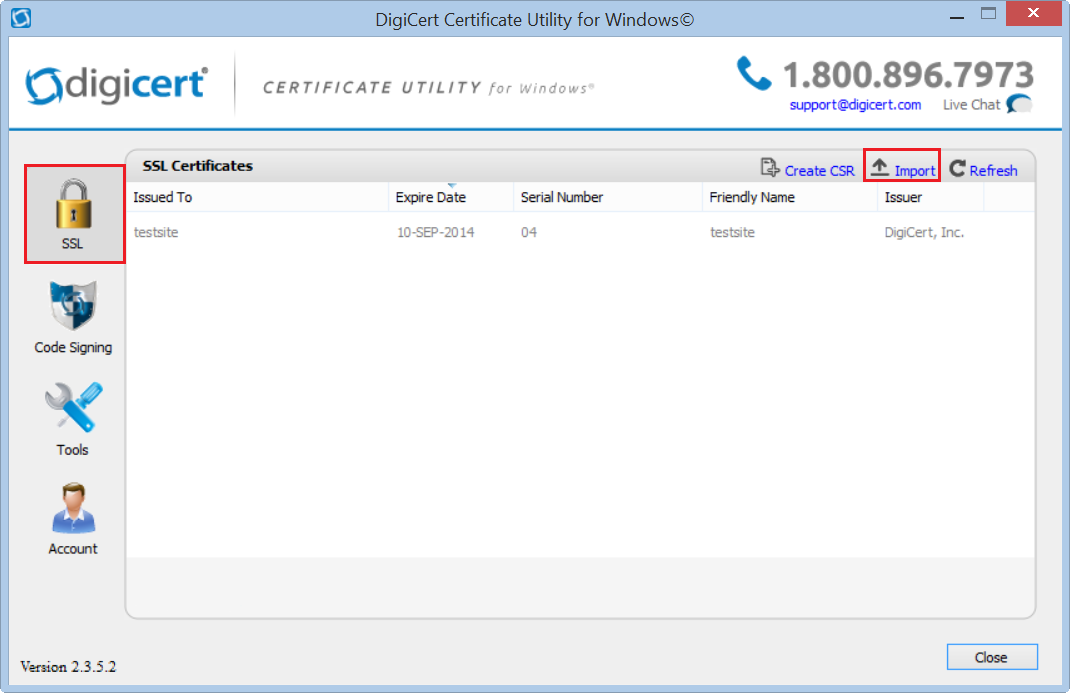
-
In the Certificate Import wizard, click Browse, browse to the .cer certificate file (e.g., your_domain_com.cer) that DigiCert sent you, select the file, click Open, and then, click Next.
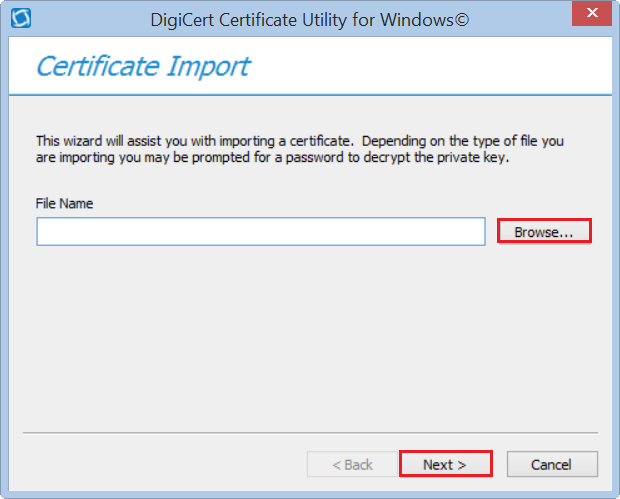
-
In the Enter a new friendly name or you can accept the default box, type a friendly name for the certificate.
Note: The friendly name is not part of the certificate. It is used to identify the certificate.
We recommend adding DigiCert and the expiration date to the end of your friendly name, for example: yoursite-digicert-(expiration date). This information helps identify the issuer and expiration date for each certificate. It also helps distinguish multiple certificates with the same domain name.
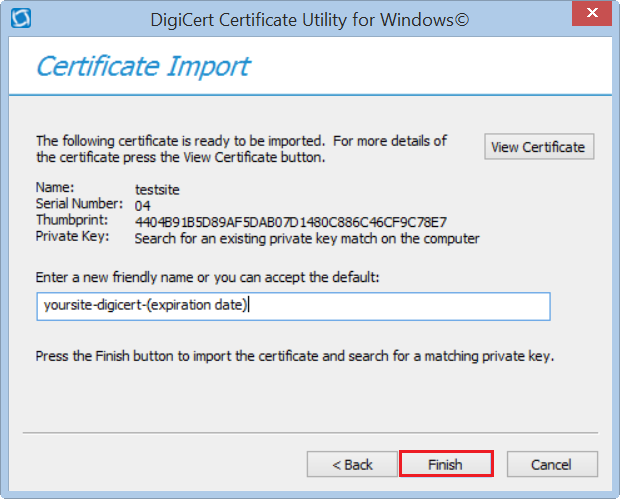
-
To import the SSL Certificate to your server, click Finish.
You should receive "Your certificate has been successfully imported" message. You are now ready to assign/configure your Windows server 2016 to use the renewed SSL certificate.
Note: If you are managing 30 or more certificates you will need to move your certificates to the Web Hosting store, which was designed to scale to a greater number of certificates. See Move a Certificate from the Personal Store to the Web Hosting Certificate Store.
IV. How to Use IIS 10 to Assign Your New SSL Certificate
After importing your new SSL certificate to your Windows Server 2016, you need to use IIS 10 to assign the newly imported certificate to secure your website.
If you have not yet created your certificate signing request (CSR) and ordered your certificate, see How to Create Your CSR with the DigiCert Utility.
-
On the Windows Server 2016 to where you imported your SSL certificate with the DigiCert Certificate Utility, open Internet Information Services (IIS) Manager.
In the Windows start menu, type Internet Information Services (IIS) Manager and open it.
-
In the Internet Information Services (IIS) Manager, in the Connections menu tree (left pane), expand the name of the server on which the certificate was installed. Then expand Sites and select the site with the expiring SSL certificate.
-
On the website Home page, in the Actions menu (right pane), under Edit Site, click the Bindings… link.
-
In the Side Bindings window, select binding for https and then click Edit.
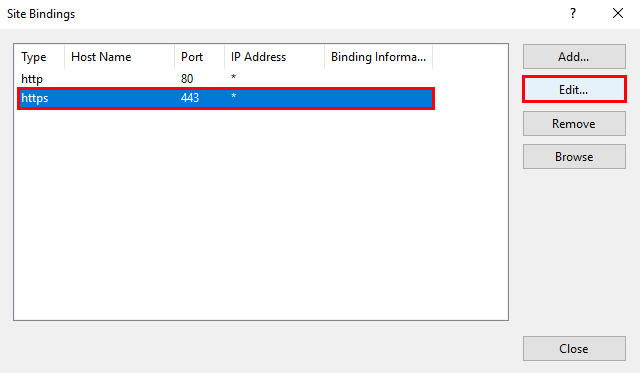
-
In the Edit Site Binding window, in the SSL certificate drop-down list, select your newly installed SSL Certificate by its friendly name and then, click OK.
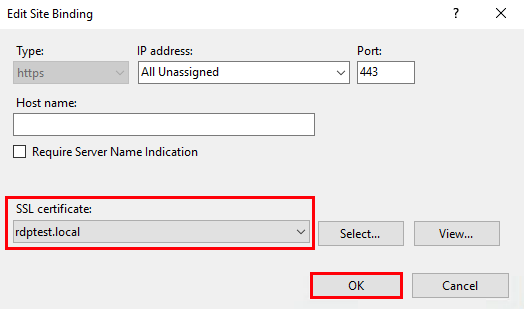
-
Your new SSL Certificate is now installed to the website.
Test Your Installation
If your website is publicly accessible, you can use our DigiCert® SSL Installation Diagnostics Tool to verify that the installation is correct. On the DigiCert® SSL Installation Diagnostics Tool page, enter the DNS name of the site (e.g., www.yourdomain.com, or mail.yourdomain.com) that you are securing to test your SSL certificate.
Troubleshooting
After you’ve installed the certificate on to the Windows server, if you run into certificate errors, try repairing your certificate trust errors using DigiCert® Certificate Utility for Windows. If this does not fix the errors, contact support.
